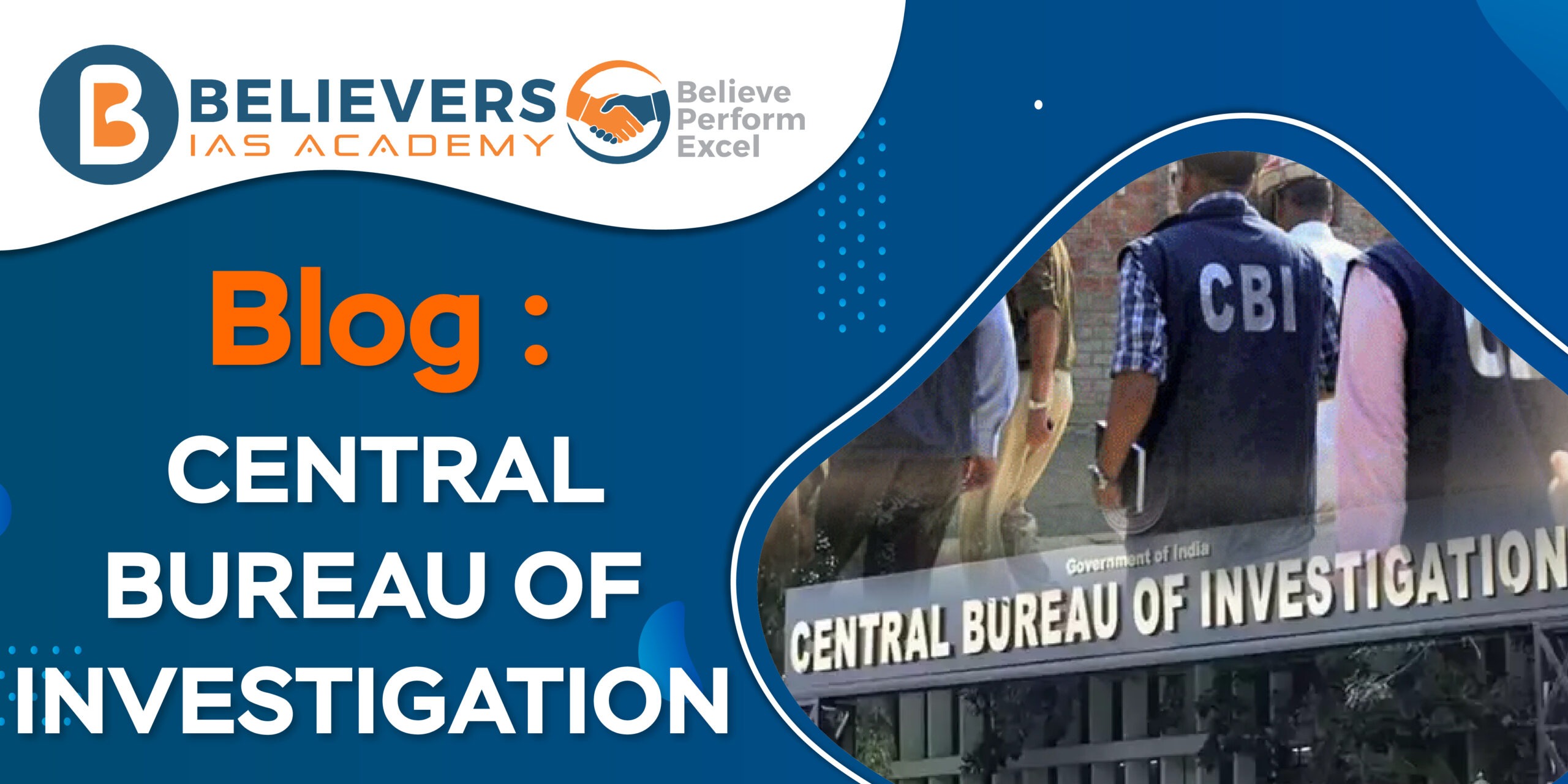Central Bureau of Investigation
Central Bureau of Investigation is known as CBI. It serves as the Government of India’s primary investigative body. The CBI is in charge of fighting corruption and upholding impartiality in government. As a Special Police Establishment, the CBI was established in 1941. In 1963, the unit’s name was changed by India’s then-Home Minister. New Delhi is home to the CBI.
The Prime Minister’s Office has direct control over the Ministry of Personnel, Pension & Public Grievances, which is where the CBI is housed. The Delhi Special Police Establishment Act of 1946 provides the CBI with its authority.
What is the historical background behind the Central Bureau of Investigations?
- Special Police Establishment (SPE): The Special Police Establishment (SPE), which was founded during British colonial control in India, is where the CBI’s origins may be found. The Government of India established the SPE in 1941 to address concerns about bribery and corruption in dealings with the War and Supply Department of India. It was entrusted with looking into corruption cases involving government employees and had its main office in Lahore.
- Post-Independence Evolution: The necessity for a central government institution to look into cases of corruption and bribery involving central government personnel persisted after India attained independence in 1947. The 1946 Delhi Special Police Establishment Act transferred the SPE to the Home Department to meet this need. By broadening its purview, it was able to look into corruption across all government agencies in India.
- Extension of Jurisdiction: With the agreement of the relevant state governments, the SPE’s jurisdiction was eventually extended to include Union Territories and states. Leaders like Sardar Patel, who wanted to fight corruption in former princely kingdoms, were the driving force for this expansion.
- Renaming as Central Bureau of Investigation (CBI): On 1 April 1963, a Home Ministry resolution gave the SPE its new name, the Central Bureau of Investigation (CBI). This name change reflected the organization’s expanded responsibility and authority beyond just looking into bribery and corruption. The CBI rose to become India’s top investigative body, taking on a variety of cases involving organized crime, terrorism, and other issues.
- Founding Director: D. P. Kohli was the CBI’s inaugural director, serving in that capacity from 1 April 1963 until 31 May 1968. He was crucial in establishing the organization’s foundation and fostering its development into a national investigative agency.
- Resource Expansion: The CBI developed a reputation for handling complicated cases over time and was frequently contacted to look into high-profile crimes including murder, kidnapping, and terrorism. By adding new divisions to handle diverse case categories, it enlarged its organizational structure,
- Legal Authority: The Delhi Special Police Establishment Act, 1946, which grants the CBI and its officers powers, duties, privileges, and obligations, serves as the CBI’s legal authority and structure.
What is the jurisdiction of the CBI?
The Delhi Special Police Establishment (DSPE) Act, 1946, which bestows the CBI and its officers with rights, duties, privileges, and liabilities, serves as the primary legal framework for the Central Bureau of Investigation’s (CBI) scope of authority in India.
- Investigation in Union Territories: Without requiring any further authorization, the CBI is permitted to conduct investigations in Union Territories in India.
- Investigation in States: The CBI’s authority may be expanded for investigations within states (which are not Union Territories), but only with the approval of the relevant state government. In other words, the CBI need authorization from the state government to undertake an inquiry within its borders.
- Investigation by Notification: If the state government agrees, the central government may use a notification to expand the CBI’s authority to look into particular categories of cases in any territory, including states. The DSPE Act’s Section 3 authorizes the issuance of this notification.
What are the types of cases handled by the CBI?
- Bribery and corruption: The CBI is well known for its anti-bribery initiatives. It looks into instances of bribery, embezzlement, graft, and other corrupt behaviour involving public servants, elected officials, and other people in positions of responsibility.
- Economic Offenses: The CBI looks into crimes that have a significant influence on the economy, such as bank fraud, financial fraud, money laundering, and other white-collar offences.
- Organized Crime: The CBI handles crimes involving organized crime, including those involving human trafficking, drug trafficking, the smuggling of weapons, and other actions taken by organized crime groups or criminal syndicates.
- High-Profile situations: The CBI is frequently requested to look into situations that garner local, national, or even international attention. These could be significant political instances, significant frauds, or incidents involving well-known people.
- Cybercrimes: Hacking, online fraud, and cyberattacks on vital infrastructure are all examples of cybercrime that the CBI has taken on in the digital age.
- Terrorism: The CBI offers assistance in the investigation of instances involving terrorism, particularly those that have an interstate or international component. It works together with other law enforcement organizations to combat terrorism.
- Kidnapping and abduction: The CBI may look into kidnapping and abduction cases, particularly those that involve ransom requests or instances that have ramifications for national security.
- Human Rights Violations: Cases involving human rights breaches may be looked into by the CBI, especially if they call for an independent, specialized investigating team.
- Interstate and international cases: Cases involving numerous Indian states or cases with an international component fall under the purview of the CBI. This covers situations involving international crime or situations requiring cooperation from other law enforcement organizations.
- Matters of Public Interest: The CBI may occasionally take on cases of public interest where there are questions about the objectivity or efficiency of regional law enforcement organizations.
What is the organizational structure of the CBI?
- The Director of the Central Bureau of Investigation (CBI) is an officer with the rank of Director General of Police (DGP), normally selected by a prominent committee. The Special Director, a senior official, and Additional Directors, who are in charge of different departments, support the Director.
- Joint Directors handle particular facets of the CBI’s operations, while Deputy Inspector Generals of Police (DIGs) are in charge of regions or divisions. Investigations are overseen by Senior Superintendents of Police (SSPs) and Superintendents of Police (SPs), with assistance from Additional Superintendents of Police (ASPs).
- The investigative levels are comprised of Deputy Superintendents of Police (DSPs), Inspectors, Sub-Inspectors, Assistant Sub-Inspectors (ASIs), Head Constables, and Constables. The CBI also hires administrative and technical professionals, including forensic specialists, legal counsel, and support staff, in addition to law enforcement officers.
What are the prominent cases investigated by the CBI?
- Rajiv Gandhi Assassination Case (1991)
- Bofors Scandal (1987)
- 2G Spectrum Scam (2010)
- Aarushi-Hemraj Double Murder Case (2008):
- Coal Allocation Scam (2012)
- Vyapam Scam (2013)
What is the Delhi Special Police Establishment (DSPE) Act?
- In 1946, the Delhi Special Police Establishment (DSPE) Act was adopted. A special police force was constituted in Delhi by the legislation to look into specific offences in the Union territory. The DSPE Act gives the Central Bureau of Investigation (CBI) its authority. In 1941, the CBI was created to oversee domestic security.
- According to the DSPE Act, the CBI must request authorization from state governments before conducting an investigation into a crime in a particular state. The Central Government has the authority to designate the offences that the Delhi Special Police Establishment should look into.
- The Central Government needed an agency to look into employee bribery and corruption, therefore the DSPE Act was put into effect in 1946.
What are the Challenges faced by CBI?
- Lack of Autonomy: The CBI has pushed for more freedom to undertake investigations independently. There is continued discussion over the need for additional independence, particularly financial and administrative autonomy, even if the Supreme Court has granted some degree of authority.
- Resource Constraints: The CBI frequently experiences resource limits, such as those related to staffing, finances, and technology resources. This may make it more difficult for it to conduct exhaustive investigations, particularly in difficult instances.
- Case Backlog: The CBI manages a backlog of cases, like many law enforcement organizations. Investigations and court cases may be delayed as a result of the sheer number of instances.
- Case complexity: A variety of cases, including high-profile and complex ones, are handled by the CBI. These lawsuits may include numerous jurisdictions, complex legal issues, and lengthy Evidence.
- Political influence: Political influence is one of the CBI’s biggest obstacles. Investigations by the agency frequently involve politicians, government employees, and people with political ties. This may put pressure on CBI staff to skew or postpone investigations to defend powerful people.




